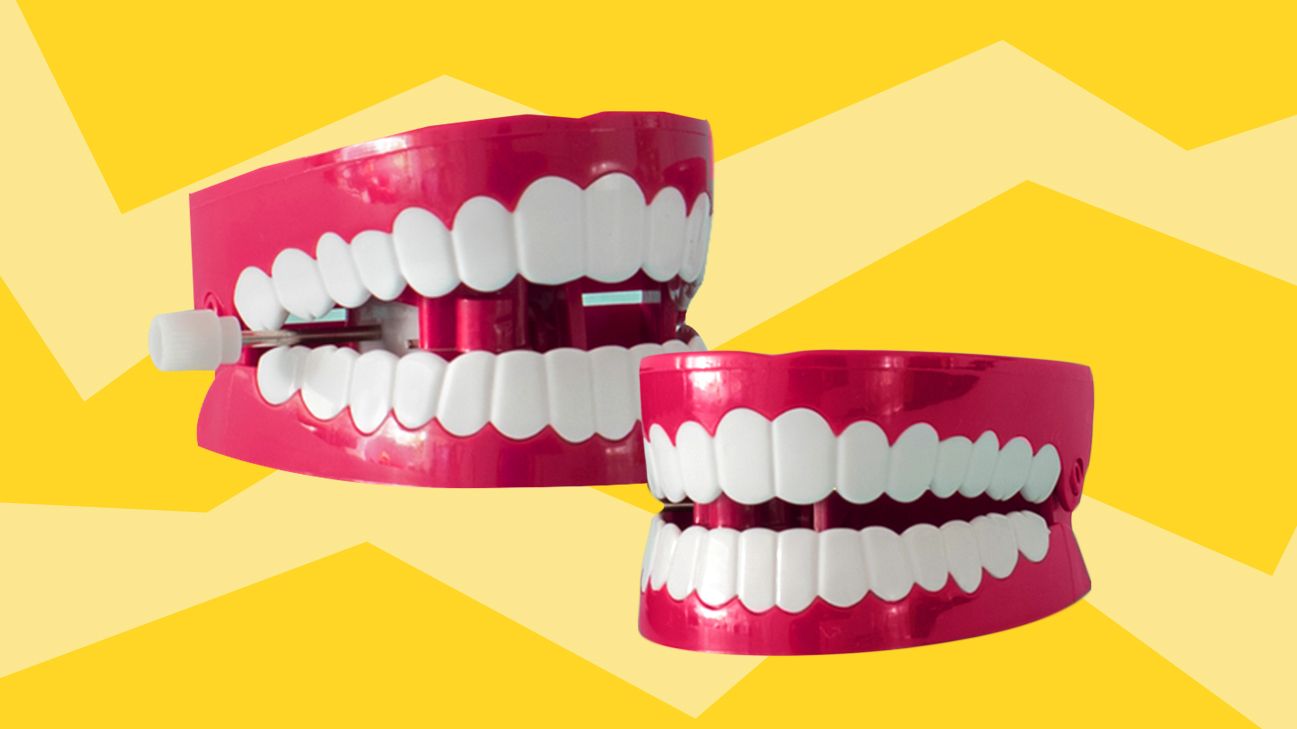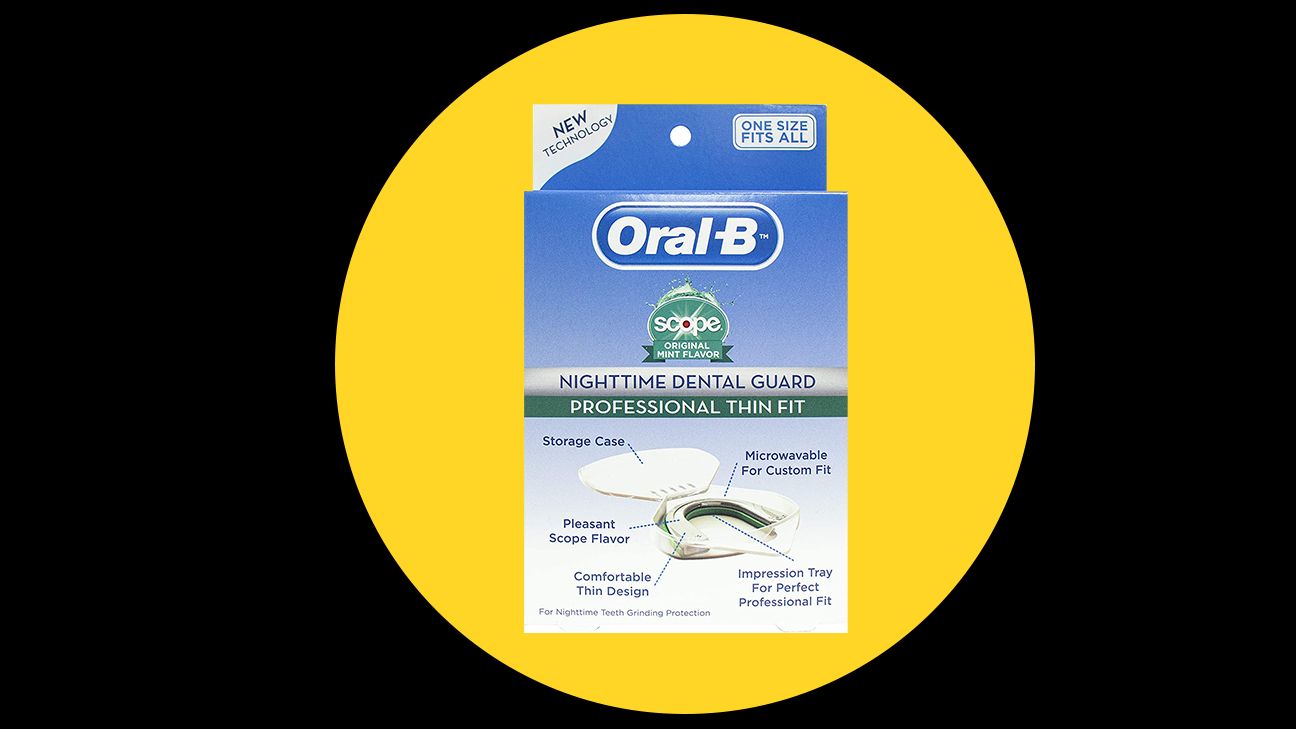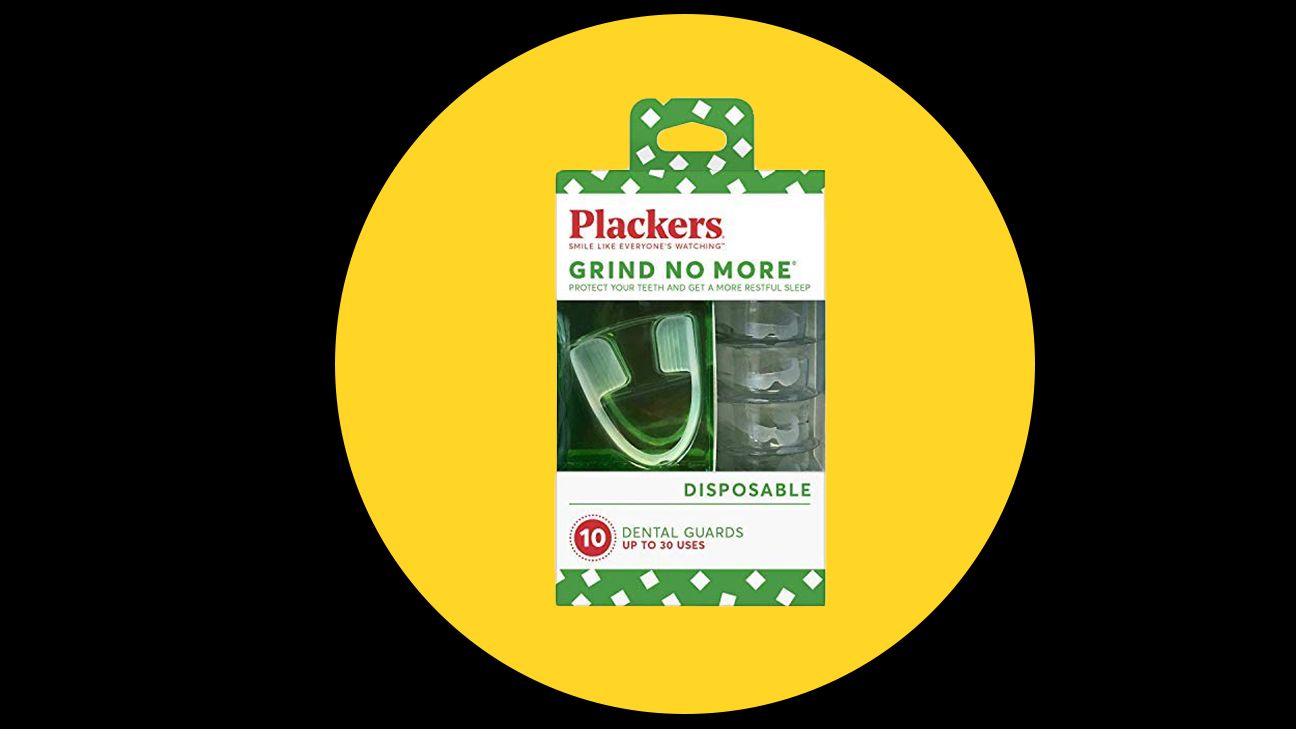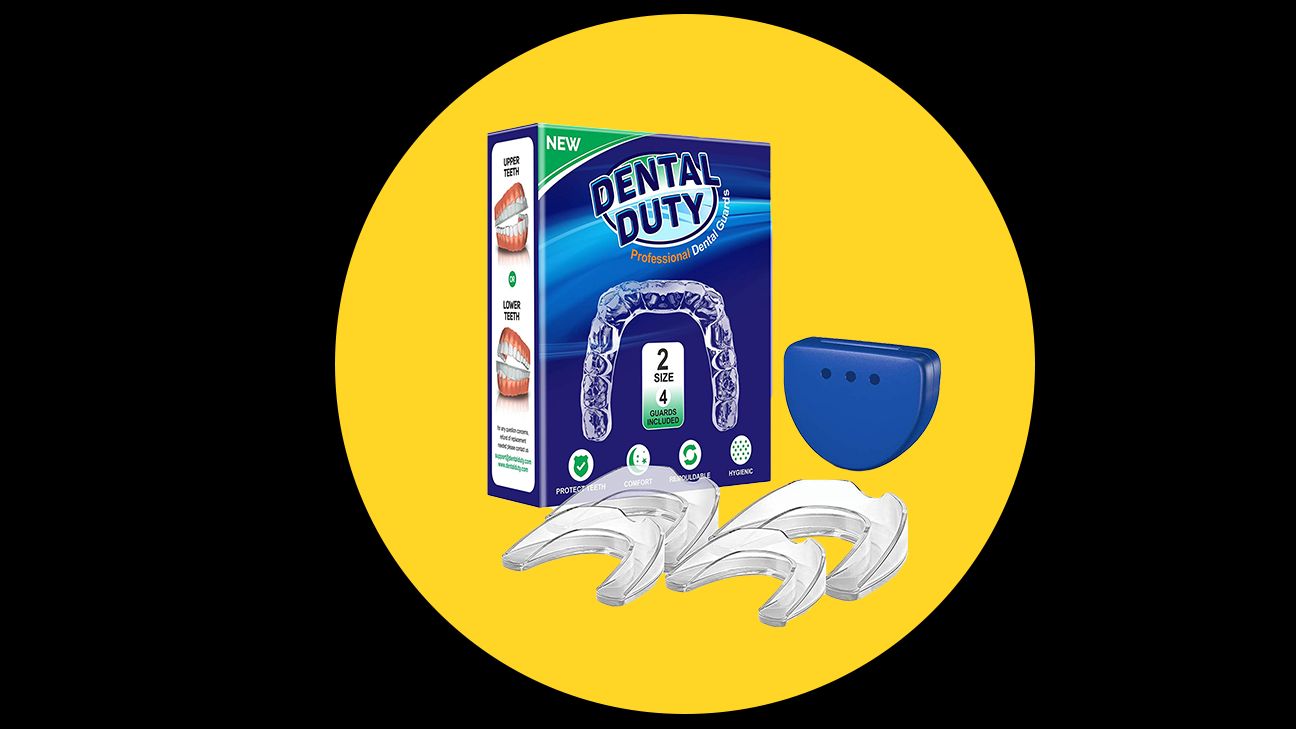We include products we think are useful for our readers. If you buy through links on this page, we may earn a small commission. Here’s our process.
Greatist only shows you brands and products that we stand behind.
Our team thoroughly researches and evaluates the recommendations we make on our site. To establish that the product manufacturers addressed safety and efficacy standards, we:- Evaluate ingredients and composition: Do they have the potential to cause harm?
- Fact-check all health claims: Do they align with the current body of scientific evidence?
- Assess the brand: Does it operate with integrity and adhere to industry best practices?
Clenching your teeth is a natural response to stress. But when this clenching becomes full-blown teeth grinding (a condition known as bruxism), it can turn into a real pain — literally.

Teeth grinding can cause headaches, earaches, or jaw pain. It affects all the muscles related to chewing. If you’ve ever woken up to your teeth sliding against each other (or maybe your S.O. has woken you up by asking, “What’s that noise?”), that’s “grinding.”
It can be subtle or cause a ton of tension in your jaw, as if your jaw is being clenched over and over (because it is!).
All the signs of teeth grinding:
- headaches
- earaches
- stiffness or pain in your jaw
- poor sleep
- worn-down or broken teeth
Bruxism often worsens at night, since you’re not conscious enough to notice and stop the behavior. If you often wake up feeling groggy and achy in your head or jaw, bruxism may be the culprit.
Because teeth grinding is commonly associated with stress or anxiety, there’s no quick fix — but stress management techniques, along with certain tools, can help make it totally manageable.
The best way to prevent worn-down teeth is to wear a professional mouth guard, the go-to treatment for teeth grinding. Custom mouth guards provide a physical barrier to protect your teeth and help alleviate symptoms like headaches and jaw pain.
Protecting your pearly babies this way can be expensive, since insurance doesn’t often cover these devices. Having one made can cost anywhere from $200 to $1,000.
You’ll need to go to your dentist to have impressions made of your upper and lower teeth and then come back to make sure the mouth guard fits and is comfortable. Sometimes adjustments are necessary to get the right fit.
It’s important to wear your mouth guard every single night!
Fixing broken teeth (and all the stress that has built up) can be more costly than a mouth guard. If you or your dentist has noticed that bruxism is affecting your teeth, take their advice. Wearing a mouth guard can be a little awkward at first, but you’ll get used to it — and the peaceful sleep is well worth it.
General mouth guard care
Rinse your mouth guard every morning and gently brush it with a small amount of toothpaste. To remove buildup, soak it in vinegar occasionally. Don’t rinse it with hot water, as it may melt.
Store your mouth guard in a clean container. Ideally, to prevent the growth of bacteria, the container should be vented or the mouth guard should be completely dry before you place it in the container. Don’t store it in a warm spot.
That said, professional gear may be out of your budget, so we also looked at some over-the-counter solutions. These are slightly less effective since they’re not molded precisely to your teeth, but semi-custom-fit options are available, and they’re much better than nothing.
Oral-B Nighttime Dental Guard
Rating: 3.7/5
Reviews: 505
Get it via Amazon.
This mouth guard is microwaveable for a semi-custom fit, and it’s flavored with minty Scope mouth wash. It comes with a storage case.
Plackers Grind No More Disposable Dental Guards
Rating: 3.9/5
Reviews: 2385
Get it via Amazon.
These disposable mouth guards come in a pack of 10, each of which is good for up to 30 uses.
Dental Duty Professional Dental Guard
Rating: 3.5/5
Reviews: 5404
Get it via Amazon.
Dental Duty’s mouth guard can be semi-custom-molded by boiling it first, and it’s suitable for both nighttime and daytime use.
These exercises can help relax your jaw muscles and reduce tension. Try them at home before bed, and finish by gently massaging your jaw.
- Open your mouth as wide as possible and touch your tongue to your front teeth.
- Open and close your jaw completely 10 times, and then open your mouth and move your jaw from side to side 10 times.
- Say the letter “N” out loud. This prevents clenching by keeping your top and bottom teeth from touching each other.
Recent studies, including one in 2018 and another in 2017, have found that Botox injections can reduce the symptoms of teeth grinding in some people. Though more research is definitely needed, this treatment could be promising because the effects seem to last for several months.
Hypnosis
Yes, hypnosis! More research is needed before we can say for sure that it works, but hypnosis has had a positive effect on some people with bruxism.
In a 2013 case study, the subject’s teeth grinding went away after seven sessions of hypnotherapy. And when the researcher checked in with the subject a year later, the grinding hadn’t returned.
Tapping
Tapping is also known as the emotional freedom technique (EFT). This therapeutic technique involves tapping on certain acupressure points throughout the body, sort of like acupuncture without the needles. It’s often used to relieve anxiety.
In addition to wearing a mouth guard, you can incorporate these prevention methods into your daily routine for a more holistic approach to fighting bruxism.
De-stress
Try one or more of these stress-management techniques that may help reduce tension in your jaw:
- Read before bed. Try escaping into a book to get your mind off of the worries of the day before going to sleep.
- Practice gratitude. Gratitude is an effective tool against anxiety, and a daily gratitude journal is a great way to get started.
- Develop a yoga practice. Yoga is a time-honored, reliable stress reduction technique (plus, it’s great for your physical health).
- Try a weighted blanket. Weighted blankets use “pressure therapy” to lower your heart rate and calm your body down, leading to more peaceful sleep.
Limit substance use
Substances like tobacco, caffeine, alcohol, and non-prescribed drugs (such as cocaine and ecstasy) are linked to bruxism, so it may help to limit your consumption of these substances during the day.
Avoid nail-biting and gum-chewing
Chewing gum or biting your nails, lips, or cheeks can get your jaw into the habit of clenching. Re-train your jaw by avoiding these activities during the day.
Get better sleep
Pillows and natural remedies can help you ease into a relaxing routine before bed. Here are some products that have been noted to ease sleep stress.
Natural remedies
While there’s little conclusive evidence about the effectiveness of home remedies for bruxism, some natural products are thought to help with teeth grinding. They can help your muscles relax, promote better sleep quality, and more.
MARNUR Cervical Pillow Contour Memory Foam Orthopedic Pillow
Rating: 4/5
Reviews: 966
Get it via Amazon.
Some pillows can help alleviate jaw pain for conditions like sleep bruxism and temporomandibular joint disorder. While the pillow may look a little unusual, some people with bruxism report great results from using it.
NOW Magnesium Caps
Rating: 4.7/5
Reviews: 1215
Get it via Amazon.
Magnesium may help relax your muscle tissues, including the ones in your jaw that cause clenching and grinding.
NOW Melatonin Supplement
Rating: 4.5/5
Reviews: 1530
Get it via Amazon.
Your body naturally produces melatonin when it’s time to sleep. A melatonin supplement can help improve your sleep quality and make you fall asleep faster.
Pura D’Or Lavender Essential Oil
Rating: 4.6/5
Reviews: 907
Get it via Amazon.
Lavender is a known aromatherapeutic sleep aid. Add it to an essential oil diffuser or combine a few drops with a carrier oil (such as olive oil or jojoba oil) and massage it into your jaw or temples. (The carrier oil is important — never apply an essential oil to your skin without diluting it.)
IMAK Compression Pain Relief Mask and Eye Pillow
Rating: 4.4/5
Reviews: 4,451
Get it via Amazon.
This weighted eye mask completely blocks out light, helping send your brain into sleep mode and soothing your face at the same time.
Nobody knows exactly what causes teeth grinding. But it’s often linked to factors such as:
- stress and/or anxiety
- certain medications, including selective serotonin reuptake inhibitors (SSRIs), a type of antidepressant
- jaw shape/structure (e.g., if your top and bottom teeth don’t meet evenly)
- use of substances such as alcohol, caffeine, tobacco, and non-prescribed drugs
- snoring or sleep disorders like sleep apnea, which interrupts your breathing during sleep
An over-the-counter mouth guard might be helpful in some cases, but for issues such as jaw shape/structure, professional treatment will be necessary.
If you notice chipped teeth, broken fillings, constant jaw pain, or frequent headaches, call your dentist for an appointment. They can help you relieve the pain and develop a long-term plan to address the symptoms.
Kim Wong-Shing is a writer in New Orleans. Her work spans beauty, wellness, relationships, pop culture, identity, and other topics. Her website is kimwongshing.com.




